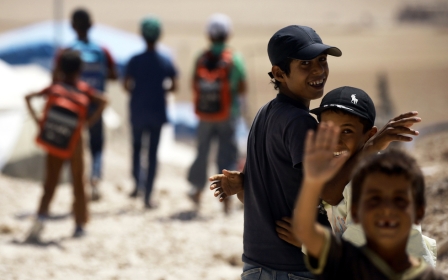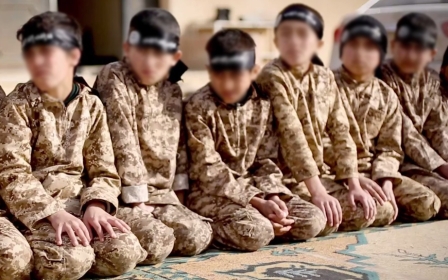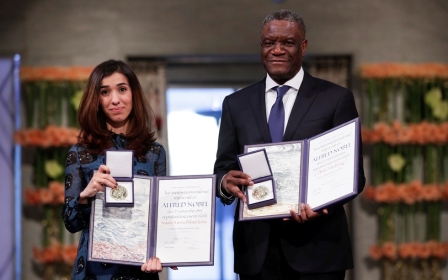Hundreds of children of IS members jailed in Iraq set to return to Turkey
ISTANBUL - Hundreds of children whose Turkish parents have been convicted in Iraq of belonging to the Islamic State (IS) group are set to return to Turkey in the next few days, Middle East Eye has learnt.
There are currently estimated to be at least 328 Turkish women in Iraqi prisons. Almost 250 of them were initially sentenced to death, but following recent appeal processes some of their sentences were reduced to life imprisonment.
In total, there are thought to be 456 children who previously lived with Turkish parents accused of being members of IS, which controlled a large area of territory in Syria and northern Iraq between 2014 and 2017.
Most of those children are currently in prison in Baghdad with their mothers or other female relatives who were handed down death sentences or life imprisonment for being members of IS.
“There is no reason to prolong the aggrieved situation of those children who are in jail with their mothers,” an official Turkish source told MEE.
“The official communication from the appeal court did not arrive yet, but we have been told that their punishment was reduced,” the same official source explained.
However, according to Yasin Maden, whose nieces were abducted by their father, an IS member, and taken to Syria, not all of the women have had their sentences reduced to life terms.
'We are acting on the basis of who the biological fathers and mothers of those children are, because according to Turkish law whoever was born to a Turkish mother or father is considered a Turkish citizen'
- Turkish official
Speaking about the return of those women’s children to Turkey, he said the process was moving slowly although developments were expected very soon.
“Hopefully they will come to Turkey in three separate groups at three separate times. The first group will be the ones whose official paperwork have been completed. Then, we will receive the second group when the processing on them is finished.
"These first two groups are in prison with their mothers. But the third group is in juvenile prison. There are around 40 children, aged between 12 and 18. They are convicted, too,” Maden said.
Most of those women and children were in Syria with their husbands and fathers who joined IS and later fled to Tal Afar after US-led coalition air strikes began in Syria.
In August 2017, nearly 1,700 women and children were captured in Tal Afar by Iraqi Kurdish Peshmerga forces as they were trying to escape fighting between Iraqi forces and IS, not having eaten or drunk for days. They were all later taken to Baghdad.
Children who were under the age of 13 and without parents were sent to orphanages. Some were born in Syria or Iraq and, as a result, did not have identity cards. Twenty of the children in the orphanages were brought to Turkey this summer, as reported by MEE.
But for the rest, the process has not been not easy.
Turkish parents?
Speaking to MEE on behalf of the relatives of these women and children upon their request, Maden stressed that Iraqi authorities were concerned that some of the children en route to Turkey might actually be Yazidi children.
“Some Yazidi children abducted by IS members were raised by them. Iraqi authorities wanted to make sure that among those children there is no one like that,” he said.
A number were born in Iraq or Syria, or are too young to remember who their parents were, Maden said, adding that the children might not be with their biological mothers.
“Some of those children were of raped Yazidi women but raised by female IS members or wives of IS members as their children.”
The same Turkish official also said that some non-Turkish women claimed that they were Turkish, as well as some children accompanying them.
“We are acting on the basis of who the biological fathers and mothers of those children are, because according to Turkish law whoever was born to a Turkish mother or father is considered a Turkish citizen,” he said.
Both Maden and the official source underlined that this was why the return process was taking time and because Iraqi authorities demanded biometrical data on those children.
“This was more than a consulate issue. It was a technical issue, too,” explained the official.
Radicalisation fears
The DNA samples of the children and their relatives were collected for a match inquiry. There were, however, some other demands from Iraqi authorities.
“They wanted to be sure that the relatives of those children who are living in Turkey are not connected to IS or any other radical groups and will not raise these children as radicals,” Maden said.
According to him, Iraqi authorities demanded assurances over the education and future wellbeing of the children from their relatives who were willing to take them into their custody.
Iraqi authorities have the idea that these children might be radicalised and return to fight against them when they grow up
- Yasin Maden, family member
“They also wanted to know where these children were going to be living. They even demanded the plot plans of their future homes,” Maden said.
“Iraqi authorities have the idea that these children might be radicalised and return to fight against them when they grow up."
Some in Turkey are also concerned that the children are being brought home without any schemes in place to help them reintegrate them and address lingering trauma caused by their experiences,
“These children are our children, and they might need help to rehabilitate their traumas. However, in Turkey there is no such facility or institution to ensure that,” he said.
Security risk?
“On the one hand, these children are a security risk, but on the other, they are Turkish citizens, and they should not be left in Iraqi prisons, this is not humane. But of course some measures have to be taken,” said Hilmi Demir, a theology professor in Ankara specialising in radicalisation.
He said the children were primarily victims of war, who had lost their fathers and mothers, and lived in prison conditions.
“On top of all that, they might have been infected with IS ideology. All these dire conditions of theirs require special care while handling them,” Demir told MEE.
According to Demir, Turkey has the capacity to overcome these issues. Different institutions have accumulated know-how deriving from the fight against militancy and violent extremism, he said.
“This accumulation has to be coordinated and has to be turned into capacity-building very fast. An institution dealing with radicalisation and, of course, de-radicalisation has to be established,” he said.
Demir stressed that the people, teachers, and psychologists that will care for the children should have unique qualifications.
“If these children are rehabilitated and in the future turn into success stories, and I do believe that it is possible if done with special care, then the fight against IS will have been won," he said.
Middle East Eye propose une couverture et une analyse indépendantes et incomparables du Moyen-Orient, de l’Afrique du Nord et d’autres régions du monde. Pour en savoir plus sur la reprise de ce contenu et les frais qui s’appliquent, veuillez remplir ce formulaire [en anglais]. Pour en savoir plus sur MEE, cliquez ici [en anglais].




